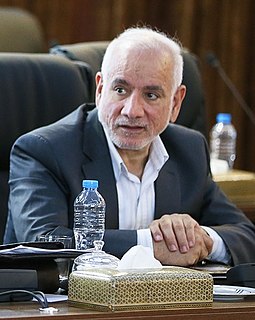A Quote by John Bolton
The European arguments against the Iran-Libya Sanctions Act demonstrate that "some Europeans have never lost faith in appeasement as a way of life. It is clear that Iran is cynically manipulating gullible (or equally cynical) Europeans to advance its development of weapons of mass destruction.
Related Quotes
Iran's Supreme Court has issued a fatwa against the development of nuclear weapons. President [Hassan] Rouhani has indicated Iran will never develop nuclear weapons. I've made clear that we respect the right of the Iranian people to access peaceful nuclear energy in the context of Iran meeting its obligations.
The Europeans are starting to show that they're finally serious about the Iranian nuclear program, and they appear to be willing to use sticks against Iran. So I think it is imperative that the United States sit down with the Europeans and say, "Let's make this very clear to the Iranians. Either they can give up their nuclear program and their support for terrorism, in which case we'll given them all kinds of benefits. Otherwise, we'll join in comprehensive, multilateral sanctions that will cripple their very fragile economy."
Countries such as Iraq, Iran, Libya and Syria, which support terrorist organizations and use terror to achieve their objectives, are precisely the same countries working tirelessly to acquire weapons of mass destruction. This combination creates a new dimension to the threat on our way of life in the 21st century.
Sanctions did indeed help to bring Iran to the negotiating table. But sanctions did not stop the advance of Iran's nuclear program. Negotiations have done that, and it is in our interest not to deny ourselves the chance to achieve a long-term, comprehensive solution that would deny Iran a nuclear weapon.
I fully share the Congress's objective of promoting nonproliferation and combating Iran's efforts to acquire weapons of mass destruction (WMD) and missile delivery systems. This issue remains at the top of the agenda with Russia as well as with other countries whose companies may be providing such assistance to Iran. In the case of Russian entities' cooperation with Iran, we have imposed penalties ten times in the past and stand ready to apply them again whenever necessary.
We support any deal that denies Iran nuclear weapons, that has a continuous and robust inspection mechanism and that has snap-back provisions in case Iran violates the agreement. Our concern is that Iran will use the income it receives as a result of the lifting of the nuclear sanctions in order to fund its nefarious activities in the region.
General [James] Mattis has said that the deal's in place. We can't unilaterally pull out of it without support from our allies because the sanctions wouldn't bite as deeply. And so he'll find other ways to push back against Iran in the various conflicts that Iran is fomenting around the [Iran] region.
Israel's discourse with the United States on the subject of Iran's nuclear project is more significant, and more fraught, than it is with Europe. The U.S. has made efforts to stiffen sanctions against Iran and to mobilize countries like Russia and China to apply sanctions in exchange for substantial American concessions.
In 2009, pre-Hillary, ISIS was not even on the map, Libya was stable, Egypt was peaceful, Iraq was seeing really a big, big reduction in violence, Iran was being choked by sanctions, Syria was somewhat under control. After four years of Hillary Clinton, what do we have? ISIS has spread across the region and the entire world. Libya is in ruins and our ambassador and his staff were left helpless to die at the hands of savage killers. Egypt was turned over to the radical Muslim Brotherhood, forcing the military to retake control. Iraq is in chaos. Iran is on the path to nuclear weapons.
Yes, I think lots of people are eager to obtain weapons of mass destruction. But there's no evidence that he has weapons of mass destruction. There's been no evidence of him testing nuclear weapons.
We have people that are in our face with nuclear weapons. We've got Iran and North Korea. We've got a problem with Pakistan. You know, I don't know what to say about that.
There's a whole lot of people that are going nuclear. And I think that Saddam Hussein is actually, with the evidence, the least able to use nuclear weapons and the least obvious offender in that area at this moment.











































